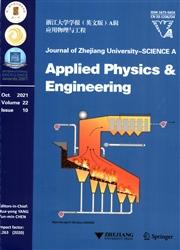Shaking table tests on a cantilever retaining wall with reinforced and unreinforced backfill
IF 3.9
3区 工程技术
Q1 ENGINEERING, MULTIDISCIPLINARY
引用次数: 2
Abstract
Physical modelling of cantilever retaining walls with and without backfill reinforcement was conducted on a 1g shaking table to evaluate the mitigation effect of reinforcement on system dynamics (g denotes the acceleration of gravity). The model wall has a height of 1.5 m with a scale ratio of 1/4 and retains dry sand throughout. The input motions are amplified to three levels of input peak base acceleration, 0.11g, 0.24g, and 0.39g, corresponding to minor, moderate, and major earthquakes, respectively. Investigation of the seismic response of the retaining walls focuses on acceleration and lateral displacement of the wall and backfill, dynamic earth pressures, and tensile load in the reinforcements (modeled by phosphor-bronze strips welded into a mesh). The inclusion of reinforcement has been observed to improve the integrity of the wall-soil system, mitigate vibration-related damage, and reduce the fundamental frequency of a reinforced system. Propagation of acceleration from the base to the upper portion is accompanied by time delay and nonlinear amplification. A reinforced system with a lower acceleration amplification factor than the unreinforced one indicates that reinforcement can reduce the amplification effect of input motion. Under minor and moderate earthquake loadings, reinforcement allows the inertia force and seismic earth pressure to be asynchronous and decreases the seismic earth pressure when inertia forces peak. During major earthquake loading, the wall is displaced horizontally less than the backfill, with soil pushing the wall substantially; the effect of backfill reinforcement has not been fully mobilized. The dynamic earth pressure is large at the top and diminishes toward the bottom.加筋与非加筋悬臂挡土墙振动台试验
在1g振动台上对带和不带回填加固的悬臂挡土墙进行了物理建模,以评估加固对系统动力学的缓解效果(g表示重力加速度)。模型墙高度为1.5 m,比例为1/4,全程保留干砂。输入运动被放大到输入峰值基底加速度0.11g、0.24g和0.39g三个级别,分别对应于小地震、中地震和大地震。挡土墙地震反应的研究主要集中在墙和回填体的加速度和侧向位移、动土压力和钢筋中的拉伸载荷(由焊接成网格的磷青铜条模拟)。已经观察到钢筋的加入可以改善墙-土系统的完整性,减轻与振动相关的损伤,并降低加固系统的基频。加速度从底部到上部的传播伴随着时间延迟和非线性放大。加筋系统的加速度放大系数低于未加筋系统,说明加筋可以减小输入运动的放大效应。在轻微和中度地震荷载下,加固使惯性力与地震土压力不同步,并在惯性力达到峰值时降低地震土压力。在大地震荷载作用下,墙体水平位移小于回填体,土体对墙体的推力较大;回填加固的效果尚未充分发挥。动土压力在顶部较大,在底部逐渐减小。
本文章由计算机程序翻译,如有差异,请以英文原文为准。
求助全文
约1分钟内获得全文
求助全文
来源期刊

Journal of Zhejiang University-SCIENCE A
工程技术-工程:综合
CiteScore
5.60
自引率
12.50%
发文量
2964
审稿时长
2.9 months
期刊介绍:
Journal of Zhejiang University SCIENCE A covers research in Applied Physics, Mechanical and Civil Engineering, Environmental Science and Energy, Materials Science and Chemical Engineering, etc.
 求助内容:
求助内容: 应助结果提醒方式:
应助结果提醒方式:


